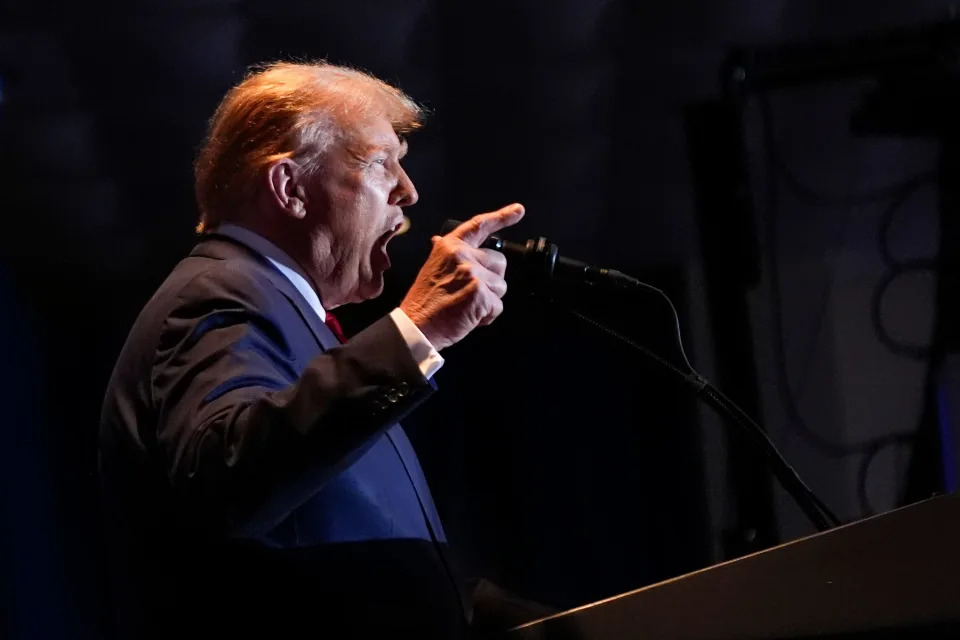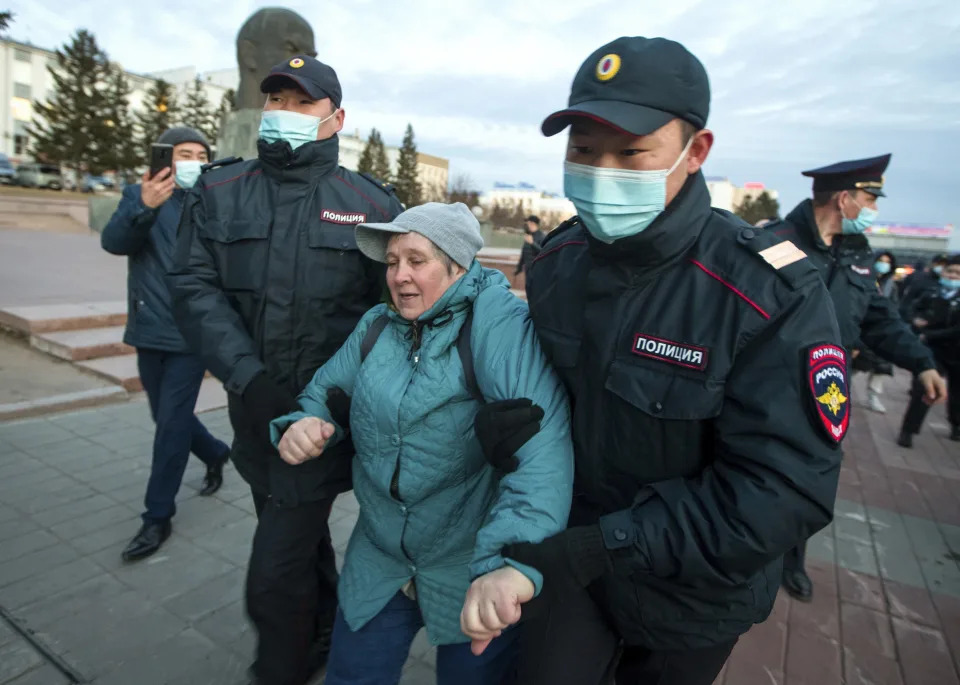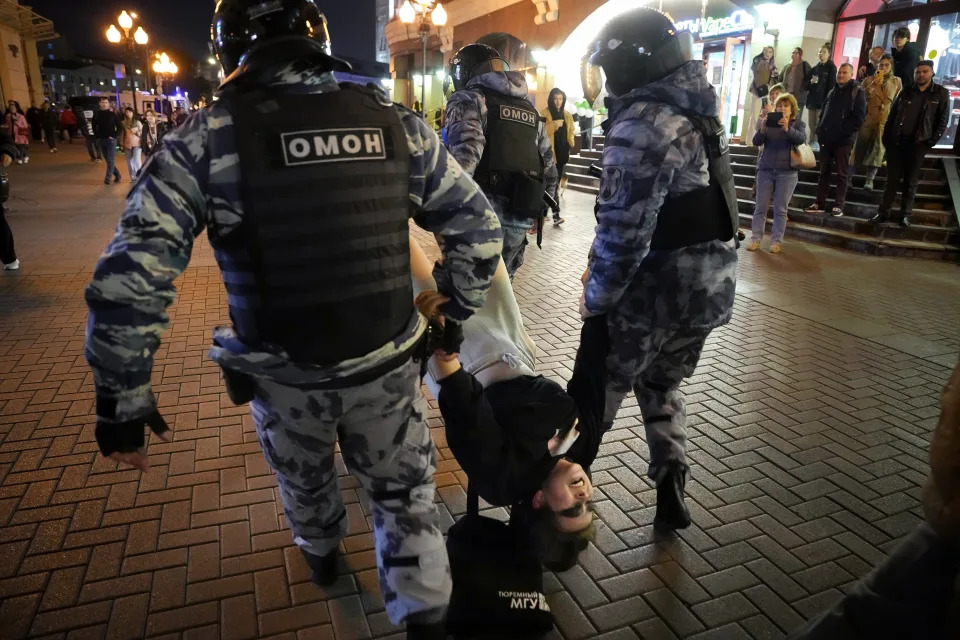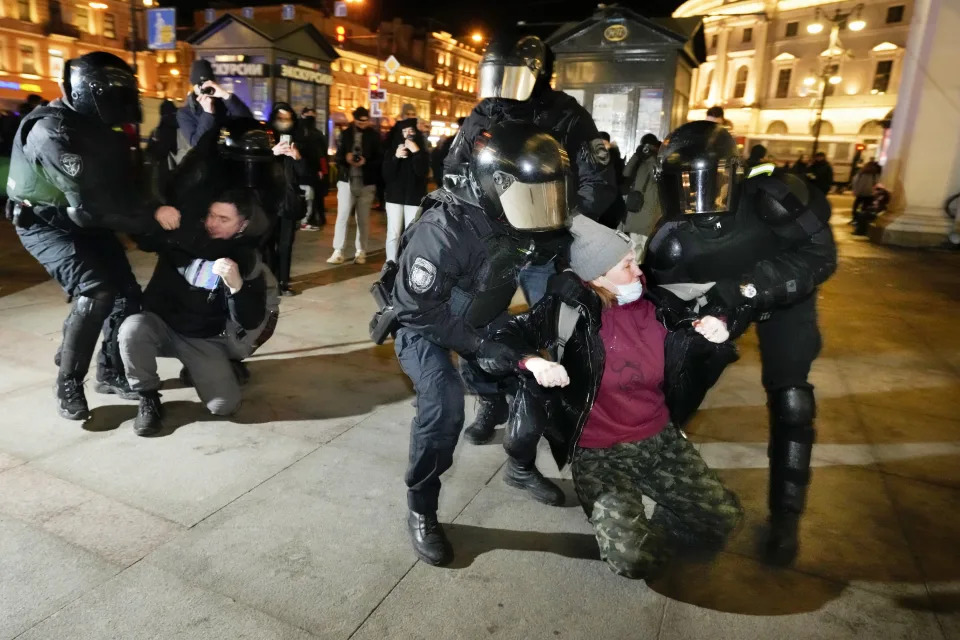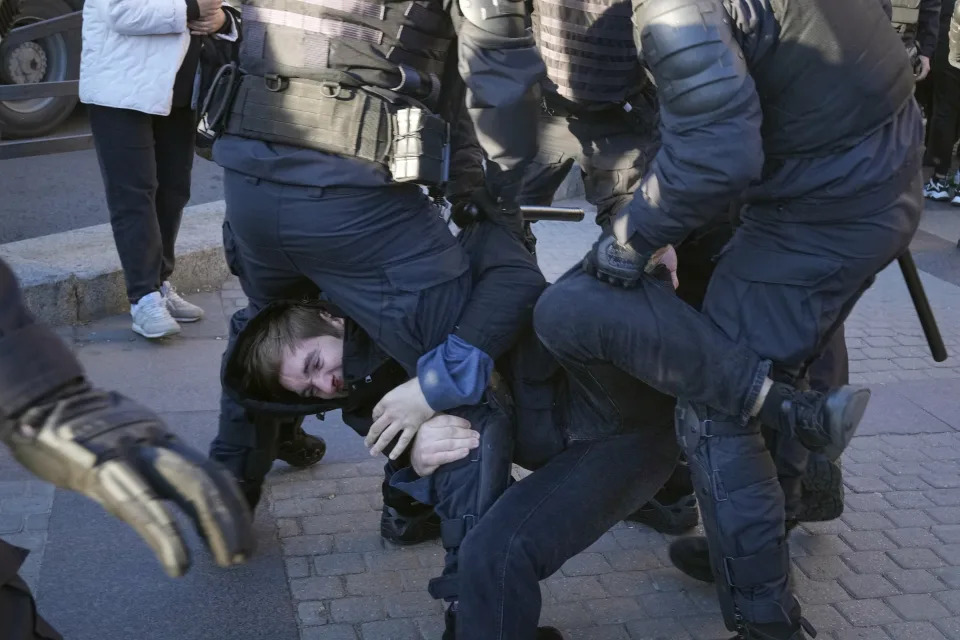Salon
“Obviously low IQ”: Former DHS official says “Donald Trump has apparent repeated memory lapses”
Chauncey DeVega – March 12, 2024

During last week’s State of the Union speech, President Biden fired a series of broadsides against Donald Trump and his MAGA movement. President Biden fired off this opening salvo and the Republicans in the audience, and more generally, never recovered from it.
Not since President Lincoln and the Civil War have freedom and democracy been under assault here at home as they are today. What makes our moment rare is that freedom and democracy are under attack, both at home and overseas, at the very same time.
Overseas, Putin of Russia is on the march, invading Ukraine and sowing chaos throughout Europe and beyond. If anybody in this room thinks Putin will stop at Ukraine, I assure you, he will not.
But Ukraine can stop Putin if we stand with Ukraine and provide the weapons it needs to defend itself. That is all Ukraine is asking. They are not asking for American soldiers. In fact, there are no American soldiers at war in Ukraine. And I am determined to keep it that way. But now assistance for Ukraine is being blocked by those who want us to walk away from our leadership in the world. It wasn’t that long ago when a Republican President, Ronald Reagan, thundered, “Mr. Gorbachev, tear down this wall.”
Now, my predecessor, a former Republican President, tells Putin, “Do whatever the hell you want.”
A former American President actually said that, bowing down to a Russian leader. It’s outrageous. It’s dangerous. It’s unacceptable.
In an essay here at Salon, Heather “Digby” Parton described Biden’s speech in the following way:
Everyone was expecting a historic train wreck of a State of the Union last night and they got it. But it wasn’t the one they thought it would be. President Joe Biden’s address was powerful and dynamic and no doubt put a lot of timorous Democrats’ worries to rest (at least for a day or so.) It was Donald Trump’s highly touted response that failed dramatically.
Biden came out swinging and knocked the Republicans so far back on their heels that they had to completely abandon the image of him they’ve been building since 2020 — a man so old and feeble that he can’t even feed himself — and instead hilariously whimper about his loud macho aggression….Biden gave a barn burner of a speech that wasn’t boring, which is highly unusual for any president but especially unusual for a president many people have been convinced has one foot in the grave.
At the end of the State of the Union speech, President Biden made a bold move, landing another salvo on his critics and enemies, who are advancing the lie of a narrative that he is somehow “too old” or perhaps even “senile” and therefore should not seek a second term in office.
In my career I’ve been told I’m too young and I’m too old.
Whether young or old, I’ve always known what endures.
Our North Star.
The very idea of America, that we are all created equal and deserve to be treated equally throughout our lives.
We’ve never fully lived up to that idea, but we’ve never walked away from it either.
And I won’t walk away from it now.
My fellow Americans, the issue facing our nation isn’t how old we are, it’s how old our ideas are.
Hate, anger, revenge, retribution are among the oldest of ideas.
But you can’t lead America with ancient ideas that only take us back.
To lead America, the land of possibilities, you need a vision for the future of what America can and should be.
Tonight you’ve heard mine.
President Biden was clearly implying that it is actually Donald Trump, and not him, who especially in these last few days and weeks, has repeatedly shown that he appears to be facing serious cognitive challenges in terms of his speech, thinking, and memory.
Sounding the alarm about Trump’s growing dangerousness, Dr. John Gartner explained to me in a widely read conversation here at Salon that, “Not enough people are sounding the alarm, that based on his behavior, and in my opinion, Donald Trump is dangerously demented. In fact, we are seeing the opposite among too many in the news media, the political leaders and among the public. There is also this focus on Biden’s gaffes or other things that are well within the normal limits of aging. By comparison, Trump appears to be showing gross signs of dementia. This is a tale of two brains. Biden’s brain is aging. Trump’s brain is dementing”.
Dr. Gartner’s colleague, Dr. Harry Segal, who is a senior lecturer at Cornell University and Weill Cornell Medical School, even went so far to suggest that Donald Trump should withdraw from the 2024 presidential campaign.
Because Donald Trump lacks impulse control and is almost pathological in his levels of projection, almost on cue following the State of the Union Speech he accused President Biden on his Truth Social disinformation platform of being a “psycho.”
At several events last week, as predicted by Dr. Gartner and his colleagues, President Trump continued to manifest apparent challenges in speech, memory, and cognition.
In an attempt to make better sense of Donald Trump’s obvious cognitive challenges and related behavior in the context of the country’s democracy crisis and the 2024 election, and what may happen next, I recently asked a range of experts for their thoughts and suggestions.
Will Bunch is a national opinion columnist for the Philadelphia Inquirer.
Clearly, Donald Trump is struggling to hold a coherent thought or find the proper word, and I notice it seems to be increasing every time he gives a speech. Everyone ages differently, and I think of my dad who just turned 87 and it totally lucid in conversation although he does occasionally forget a name (as do I, at 65!), I’m not at all an expert on brain health, but based on what’s observable and also the folks who are experts whose analyses I’ve read I think there’s a real problem.
Voters should have serious conversations about what it means to be president, what the real issues are around presidential health, and how Trump and Biden might be different from each other. Generally speaking, I think the Ronald Reagan “charismatic actor” reinvention of the presidency makes people forget that we’re actually electing the CEO of a massive organization, with smart people in corner offices channeling the policies and morals of the boss. No one is bombing Barbados instead of Syria because an aging president said the wrong thing. That said, I think Trump’s mental struggles should be taken seriously by voters because in his case it seems to be linked to his moods and his temperament. He’s promised a presidency of “retribution” and to surround himself with aides who can act on his whims. That’s concerning. But will most voters care? Probably not.
It feels like the lessons the mainstream media have taken from the Trump years are exactly the wrong ones: a doubling down on a bland and ultimately phony interpretation of “balance and objectivity.” It seems that occasionally going out on a limb and calling out Trump for some of his lies from 2017-2021 means they were salivating for a chance to prove they can be just as tough on Biden – whether or not he deserves it. For a time, that stalking horse was “inflation,” but the price increases cooled, and Biden got four years older, so here we are. So much of this is journalists indulging voters by focusing on style when the substance in this election is life or death for America.
Miles Taylor is a national security expert who served under the Trump administration as chief of staff at the Department of Homeland Security. Writing as “Anonymous,” Taylor published the widely discussed 2018 New York Times op-ed “I Am Part of the Resistance Inside the Trump Administration.” Taylor’s most recent book is “Blowback: A Warning to Save Democracy from the Next Trump.”
Donald Trump is obviously a deeply troubled person. Strip away the politics and his biography, and any person who would spend time with the man would come to the same conclusion: he’s a sick person, devoid of any moral system beyond relentless self-aggrandizement. The self-interest colors his every interaction. The man’s eyes scan every room — and situation — opportunistically for leverage, for moments to advance himself at the expense of others. This has happened to the people closest to him … to his employees … and to the country.
On a more simple level, Donald Trump has apparent repeated memory lapses, difficulty synthesizing complex information, disinterest in nuance, and an obviously low IQ. He’s not a smart man, and some would say he shows clear signs of decline. If it were a screenplay, a wannabe gangster with dementia might be an oddball comedy. But on the national stage, it’s a civic tragedy.
Ultimately, the election is less about Trump than it ever was. It’s now about us. We elevated a man to the nation’s highest office, witnessed a truly innumerable string of incidents displaying his ineptitude and immorality, watched him attempt to subvert the Constitution and commit crimes, and now we are giving serious consideration to restoring him to that office. If that is what we are doing, one might say we deserve a second Trump presidency. Perhaps it will be enough to shock the conscience of our society that it’s time to renegotiate our social contract. Perhaps not.
Yes, Joe Biden has lost his step. It shows. But there’s no comparison between an elderly man and an authoritarian one.
Jared Yates Sexton is a journalist and author of the new book “The Midnight Kingdom: A History of Power, Paranoia, and the Coming Crisis.”
I see a deeply unwell person. I think sometimes we get lost in politics and forget to look at the situation as human beings. What we’re dealing with is an abusive, deteriorating man who is somehow even getting worse. Fascism feeds on that unwellness and accelerates the process until it leaves a husk, a host, and that’s what we’re watching in real time. Everything else stems from that and that, coupled with the rhetoric, tells a story we should all be listening to.
As I say all the time, a healthy political system and American society would have rejected Donald Trump in 2016 like so much bad food. That it didn’t betrays a sickness. What should happen is a complex series of legal consequences and systematic expulsions. On a political level, a complete rejection by the electorate and movement toward something reconciliatory.
Biden’s age is an issue. We should be concerned about the fitness of a president. The media obsession is simply the same thing that propelled the e-mail debacle. Lazy journalism mixed with the neoliberal refusal to wrestle with itself. They want a right-wing turn in their bones but aren’t even conscious about it. These cycles give themselves away after a while.
Investigative reporter Heidi Siegmund Cuda writes about US politics and culture at her Substack newsletter and for Byline Times, and Byline Supplement.
I do my best not to watch the spectacle of Trump. He’s an avatar for the destruction of our country and America as a reliable ally, and his “moth to flame” circuses have turned us into stock characters — the outraged or the devoted. But it’s impossible to not see the clips of his antics, and yes, the obvious sloppy, sweaty decline is notable. But always when we’re watching a propagandist in action — how much is organic and how much is miming Vincent the Chin’s ‘bathrobe shuffle’? It behooves him to be “losing it” when committing crimes, and this cat has had more than nine lives. He detonates narrative warfare wherever he goes, so it’s difficult to decipher what is planted to create spectacle to feed the mangy cult and what is a true trash fire of a human.
The more critical framing for me is what it says about us that a man who led an insurrection, is an adjudicated sex assaulter, a convicted fraud, an agent of Russian disinformation who engaged in a cover up of his own nefarious activity, and a likely superspreader of America’s most guarded secrets, is a political party’s frontrunner. I guess I don’t care if he mispronounces “Venezuela” while appearing to get high on his own supply, I care about the fascism. Project 2025 is a fascist endeavor.
If we were a healthy society, we would prioritize a return to decency and the rule of law. We would swiftly arrest Donald Trump and his co-conspirators for their complicity in an attempted coup, which somehow this country seems to have forgotten. I’m tired of limited hangouts — I’m tired of small sentences for big crimes, and convictions for minor players. I want to see this country standup against authoritarians and oligarchs, who are trying to remove all barriers to their unrestrained lust for power. From the moment Trump removed language to water down support for Ukraine at the 2016 RNC, his role has been to hand Ukraine to Russia, which he is now doing through his proxies like Mike Johnson. I bring this up because until we have a proper framework, we will be continually tilting at windmills. The proper framing is Trump, his proxies, and his handlers, are aiming to destroy the US as an international power. They are using narrative warfare as a battering ram, and we need to take back the narrative quickly. We need to bullhorn the stakes. Women will likely have to take the lead, because it’s our rights that are imperiled.
The media’s obsession with Biden’s age (“But His Age….”) is America getting caught in the trap of narrative warfare, yet again. “But His Age” is simply “But Her Emails” as we saw with Hillary Clinton — it’s a gaslighting mantra for simpletons who don’t want to think too hard about the fact that we are the targets of a global fascist criminal movement attempting to eviscerate democracy. The New York Times and cable news know this, and they’ve placed their bets on fascism. Big News is big business and big business has historically supported fascism. This is why we as independent members of the media must help shape the narrative. Our choice is literally good vs evil. We have a choice between decency and a vast criminal network — a choice between standing up for our imperfect democracy or succumbing to complete authoritarian capture. It’s not about age — by Biden’s side is a perfectly healthy vice president, who can capably handle the labor of democracy should he fall ill.
The 2024 election is not about anything other than decency — are we good people — is our President a good man — are we decent — do we know right from wrong. If we are decent, we will re-elect Joe Biden, we will do everything to help Ukraine defeat Russian imperialism. We will rebuke the cruelty of Trumpism and Putinism. We know that Trump is a cruel man. We knew that when he called immigrants ‘rapists’, called women “fat pigs”, “dogs”, and “disgusting animals”, mocked a disabled person, and ginned up violent rhetoric to encourage his MAGA base to kill Mike Pence. We must decide who we are. Are we decent?

